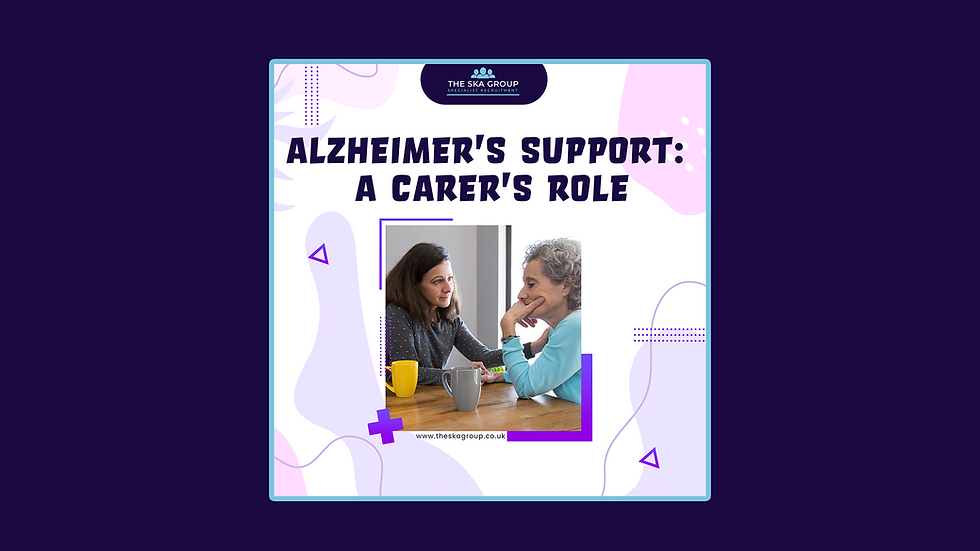Rheumatoid Arthritis Awareness Week 2025
- Emily

- Sep 17, 2025
- 4 min read
Rheumatoid arthritis (RA) is often misunderstood as simply “aching joints” or “just getting older.” But for the millions of people living with it, RA is a daily reality that can affect energy, confidence, and even independence. This Rheumatoid Arthritis Awareness Week 2025, we shine a light on what RA really means, the role carers and support workers play, and how kindness, understanding, and innovation are helping people live fuller, more empowered lives.
What Is Rheumatoid Arthritis?
RA is a long-term autoimmune condition. Instead of protecting the body, the immune system mistakenly attacks the lining of the joints. This creates inflammation that can lead to swelling, stiffness, and pain. Over time, RA can damage cartilage and bone, and it doesn’t always stop there - the condition can also affect the heart, lungs, and eyes.
Unlike some conditions that come and go, RA is persistent and unpredictable. Symptoms often flare up without warning, leaving people exhausted one day and feeling a little better the next. These ups and downs can make daily routines difficult, especially when activities require energy, mobility, or concentration.
Recognising the Signs
Spotting RA early is key to managing it effectively.
Common early signs include:
Stiffness in the morning that lasts longer than half an hour.
Swollen or tender joints, often in the hands, wrists, or feet.
Fatigue and an overwhelming sense of tiredness.
Symmetrical pain - discomfort felt on both sides of the body.
Subtle changes in appetite, mood, or energy levels.
These symptoms can sometimes be dismissed as stress, overwork, or “just getting older,” so as a result, awareness is vital. The earlier RA is identified, the sooner treatments and support can help protect joint function and improve quality of life.
Living Well with RA
Living with RA doesn’t mean giving up independence or enjoyment - it means learning to adapt and balance.
Everyone’s journey is different, but a few strategies can make life with RA more manageable:
1. Treatment and Professional Support
Modern medicine offers treatments that can slow the progression of RA, reduce inflammation, and help protect the joints. Regular check-ups and working closely with doctors, physiotherapists, and occupational therapists can make a real difference in long-term outcomes.
2. Daily Lifestyle Adjustments
Simple lifestyle changes can support overall wellbeing. Light exercise like swimming or stretching helps keep joints flexible. Eating nutritious, balanced meals fuels the body, while prioritising good sleep gives it time to heal and recover.
3. Coping with Flares
RA often comes in flares - times when symptoms suddenly worsen. Planning for these days is important. Using heat packs, resting more, or relying on adaptive tools like jar openers or supportive cushions can reduce stress and strain.
4. Emotional and Social Wellbeing
RA isn’t only physical. Living with daily pain or unpredictability can take a toll on mental health. Staying connected with friends, joining support groups, or simply having someone to talk to can help people feel less isolated. Carers and loved ones play an invaluable role here, offering reassurance, encouragement, and a sense of stability when life feels unpredictable.
The Role of Carers and Support Workers
Carers are often the quiet heroes of RA support. They provide practical help, but also bring the emotional strength that makes all the difference.
Their role may include:
Supporting with daily tasks during difficult days.
Helping with medication schedules and encouraging adherence.
Offering gentle reminders about pacing activities and taking breaks.
Providing companionship and lifting spirits during low moments.
Observing changes in symptoms and helping communicate these to professionals.
Support workers, too, make life more manageable by empowering people with RA to stay independent while still receiving the help they need. Small acts of kindness - carrying something heavy, offering reassurance, or simply being present - often have the biggest impact.
Finding Hope and Strength
One of the most powerful messages during RA Awareness Week is this: life with RA can still be joyful, meaningful, and full of possibilities. Treatments are improving, technology is creating new adaptive tools, and awareness is growing. More workplaces, communities, and social spaces are learning how to be inclusive and supportive of people with chronic conditions.
Most importantly, people with RA are not defined by the condition. They are parents, colleagues, friends, and community members with dreams and goals - and with the right support, they can continue to thrive.
A Shared Responsibility
Awareness is not just for those directly affected by RA - it’s for everyone. By understanding what RA is, we can be more compassionate neighbours, co-workers, and friends. By recognising when someone is struggling, we can offer support instead of judgment. By valuing the work of carers and support staff, we acknowledge the essential role they play in building stronger, more inclusive communities.
As we mark Rheumatoid Arthritis Awareness Week 2025, let’s remember that every small act of support matters. Whether it’s a carer lending a hand, a colleague showing patience, or a community raising awareness, together we create a world where no one with RA feels left behind.
Rheumatoid arthritis may bring challenges, but with understanding, compassion, and the right care, people can live not just with RA - but beyond it.




Comments